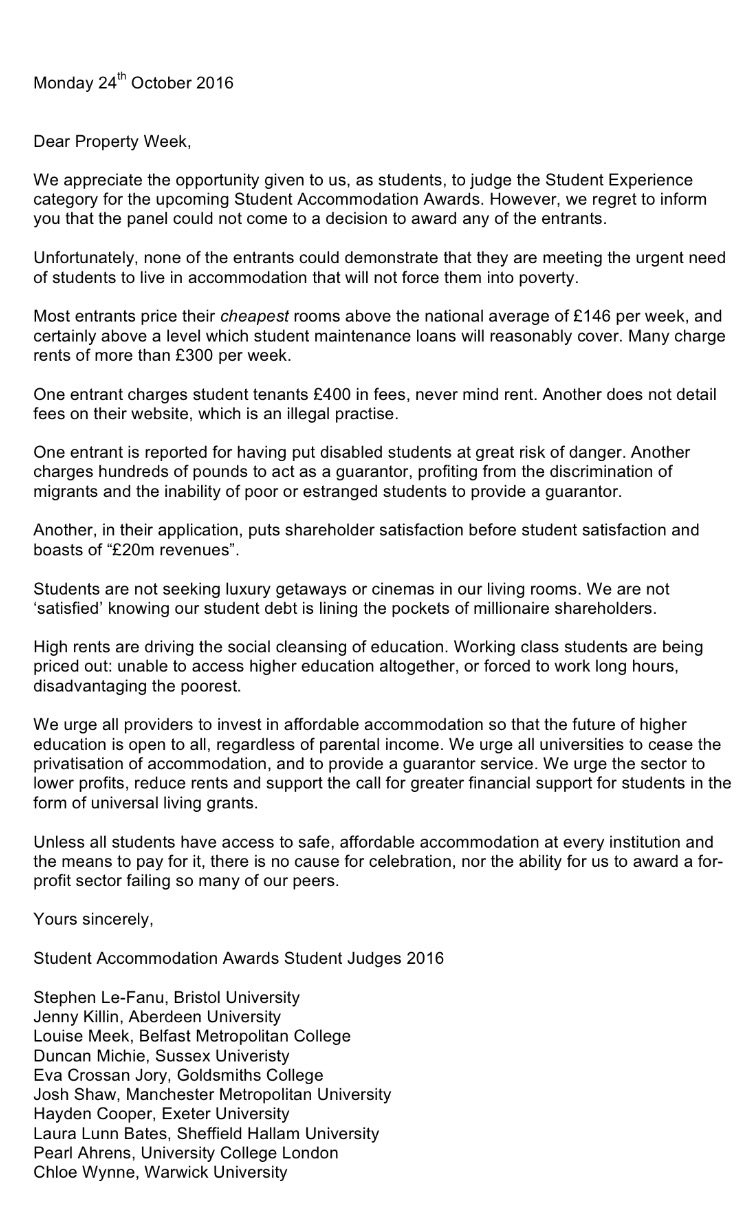Why UK students are protesting against private accommodation providers
Judges’ refusal to nominate a winner in the inaugural Student Accommodation Awards caused embarrassment for exploitative accommodation providers, but there’s much worse to come, says a student activist
- Student finance
- Student life
Share
It will come as no surprise to most people that the real estate market news magazine, Property Week, and university students, have different definitions of the “best student experience”. Well, except for those organising the publication’s inaugural Student Accommodation Awards, who apparently didn’t expect this tension.
Earlier this week, a panel of 10 hand-picked students from across the country delivered their verdict for the “best student experience” category: no entrant should win. Not Student Cribs, with their throwback Noughties name, nor even Scape, for providing the opportunity to live “where time began” in Greenwich – starting from £235 per week.
Rather than focusing on the abundance of luxury provided by many of the entrants – think private cinemas, gyms and 24-hour concierge services – the judges reached a unanimous decision not to award any candidate the prize because none met their basic criteria of “not forcing them [students] into poverty”.
Nevertheless, despite the popularity of the judges’ decision online, action like this is unlikely to influence the practices of private accommodation providers operating in the UK. While the judges have forced Property Week into cancelling the “best student experience” award, the fact remains that student accommodation is now a £43bn industry, with £5.1bn in transactions annually. Enormous sums of money are now being made in this sector as companies routinely charge students rents above the £147 per week national average, with many rooms exceeding £300 per week.
Set against a background of a rapidly escalating student mental health crisis, no doubt made worse by the financial stress of immense debts accumulated in pursuit of higher education, and at a time when increasing numbers of students are having to rely on additional financial support, the judges’ refusal to name a winner is much more than just a stunt. Students are beginning to take radical action to reclaim their residences, with the rent strike movement soon to spread from university-run halls to the private sector.
This movement, exemplified by protests at University College London and across London this year, comes in response to significant increases in the cost of university-run student housing. The national average annual rent now comfortably exceeds half of the maximum student loan, with the most expensive universities, such as the London School of Economics and UCL, demanding an average rent of about £180 per week.
In university-run accommodation, rent hikes are the equivalent of tuition fee increases by stealth. Students are forced to pay higher and higher fees for their education, and the additional funds collected through rent are often rerouted to fund multibillion-pound estate expansion plans, fuelling the ceaseless growth necessitated by the modern neoliberal model of higher education funding.
It’s this dynamic that has permitted the burgeoning private student rental market. As universities struggle to deal with the competing factors of underinvestment in their prevailing accommodation stock and the necessity of enrolling increasing numbers of students to plug funding gaps caused by the restructuring of university funding in 2010, private providers have moved in to fill this vacuum – and make it as lucrative as possible.
At the centre of this are the millions of students in the UK. Now transformed into customers in the marketplace of higher education, students fund multibillion-pound expansion plans and the profits of private accommodation providers through their accumulation of tens of thousands of pounds worth of debt. It would be misguided to think that this is a safe or secure model.
At UCL, after rents were raised year-on-year to an average of £180 per week, students felt forced to take radical action; after staging a five-month long rent strike, the approximately 1,000 strikers ultimately agreed a deal worth over £1,000,000 with university management.
Building on this, activists from the campaign at UCL teamed up with the Radical Housing Network, Plan C, the National Union of Students and other campaign groups to hold the Rent Strike Weekender in South London last month. Students from more than 25 universities attended this three-day event of workshops and skill-shares on organising rent strikes and student housing campaigns.
Since then, over 1,000 students at the University of Sussex have signed a petition in protest at rent prices at their accommodation, and a group of students occupied part of the headquarters of the private student halls company, Unite. Later this month, activists from across the country will link up again in London on the Rent Strike bloc at a demonstration for free education.
All of these actions are the building blocks of a steady escalation of action that could lead to rent strikes if the demands of students continue to go unanswered by university management.
Today we’re seeing just the early developments of this movement. While the decision made by these student judges focused attention on the supremacy of profit in the provision of student housing, as students start to acknowledge their exploitation and campaign groups prepare to fight back, the real battle is beginning on campuses right now.
Without a national shift to put students – and education – first, universities and private accommodation providers will be facing problems far worse than not winning Property Week’s award when the payments stop.
Keep up to date by connecting with Rent Strike on facebook: facebook.com/rentstriker

Angus O'Brien is a rent strike activist, currently studying at University College London on the European Social and Political Studies course.


